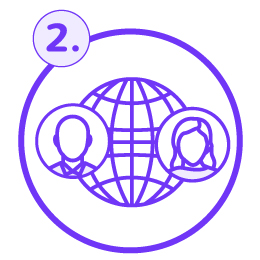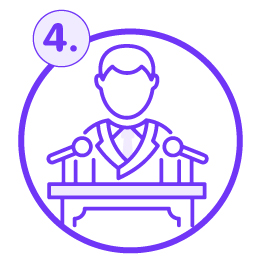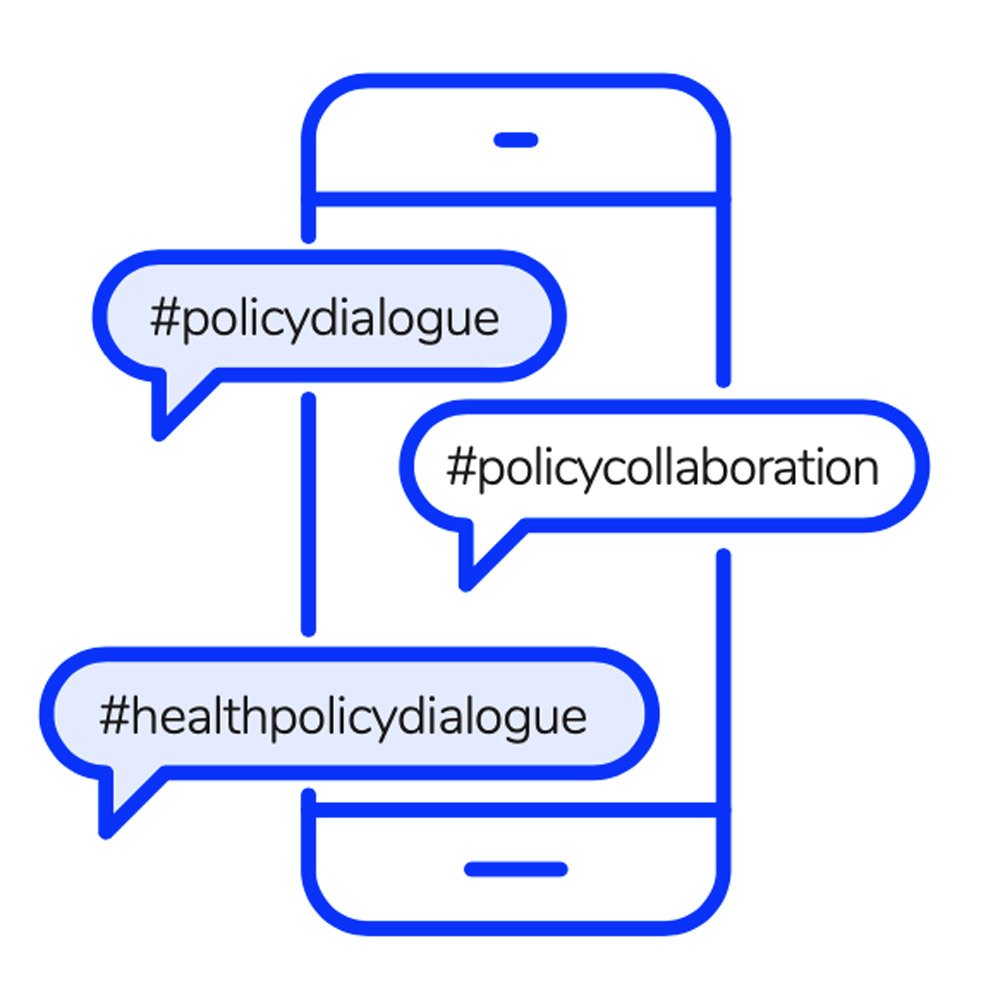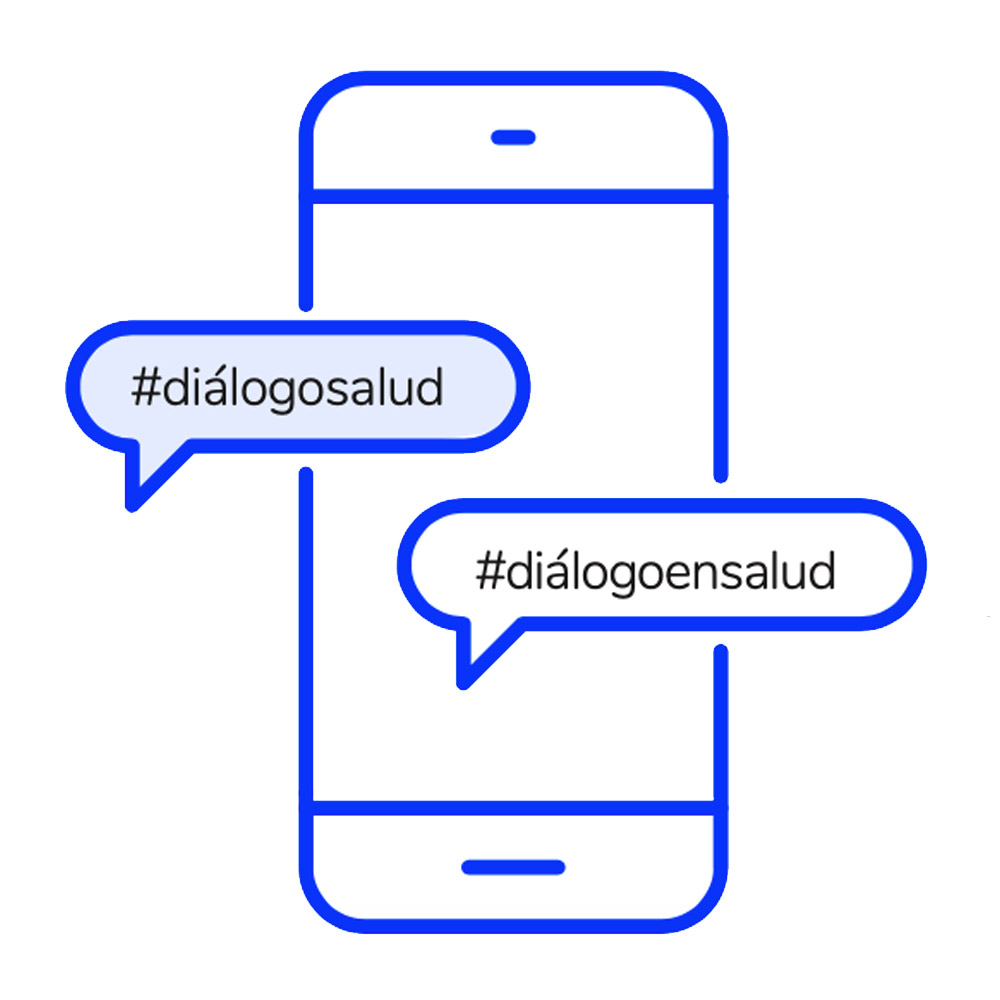A Venue for Policy Dialogue
Overview
Virtual interaction between patient advocates, policymakers and government officials during the Covid-19 pandemic has proven critical for finding solutions for patients requiring non-Covid care under difficult lockdown circumstances and facing unique access barriers. Such interactions have also helped stakeholders align on broader policy changes necessary to better deal with the public health emergency. Patient advocates will want to see this connectivity with government authorities continue in the post-pandemic context.

In a post- pandemic context, patient advocate leaders and policy decision makers will benefit from a more formal mechanism for regular interaction.
Regularly scheduled discussions with public officials are an opportunity for greater patient participation in health sector decision making. Better connectivity can also unite patient advocacy organizations of different sizes and capacities on a common agenda to strengthen health delivery, improve access, and protect patients.
For their part, policymakers and government officials have adapted to virtual communication with key constituencies. In fact, some public health officials actively seek out patient advocates for pandemic-related assistance and policy advice. This interaction increases health governance transparency, alignment, and cooperation across the entire sector.
Moving forward, there is an opportunity to establish more formal means of policy dialogue between advocates, health officials, and policymakers on a regular basis. Common spaces for continued dialogue post-pandemic will amplify inclusion of the patient perspective and strengthen health policy with more collaborative decision-making approaches.
Policy "Ask"
The Covid-19 pandemic highlights the importance of regular dialogue between government officials, policymakers, and civil society patient advocates to find new ways to help patients and consider policy options for stronger health systems responsive to patient needs.
In a post-pandemic context, patient advocate leaders and policy decision makers will benefit from a more formal mechanism for regular interaction. When possible, the mechanism chosen for regular policy dialogue should be formalized in law or by regulation to encourage long-term continuity and sustainability.

Key Messages

It has never been more important for the government and civil society groups to work together to identify common challenges, understand different perspectives, and find solutions to better meet the needs of the public and of patients.

Patient advocates are a unique resource for evidence on the lived experience of patients and the patient perspective is increasingly important for informed, evidence-based policy.
This evidence is of little use without a regular venue for advocates to share information with those responsible for policies to improve health care organization and delivery.


Patient advocacy organizations are an increasingly trusted resource for educating the public and patients about policy proposals being considered, or about how a new approved policy will impact the patient community.

A shared communication venue with policymakers offers government agencies and other authorities the opportunity to be more transparent, responsive, and efficient, all of which are hallmarks of good health governance.


A shared space for regular communication can add important legitimacy for all parties involved.
It can help change public perceptions regarding government indifference and help raise awareness of the value of civil society and civic participation.
Questions and Answers
Questions
Would having a virtual space replace mechanisms that already exist for patient advocates to interact with government officials or policymakers?
Answers
No, this would not replace other mechanisms. Advocacy organizations interact individually, and at times in concert, with their governments in many ways and at many levels. This should continue.
Questions
How often would sessions take place and who will organize and run the meetings? Who decides the agenda and who would be eligible to attend?
Answers
Precise coordination models and mechanisms can be discussed and vetted thoroughly with stakeholders prior to implementation. Ideally, policy dialogue sessions should be open to any patient advocacy group and any government or policymaking agency wishing to participate.
Questions
Why should such a space? for dialogue be made official in law or by regulation? Couldn't this be organized more informally?
Answers
Given frequent personnel changes in health sector governance, a formal mechanism is more sustainable and prevents individuals or entities in a position of power from either hijacking the process or canceling the interaction unilaterally.
Questions
Would these sessions be open to the public and/ or information from these sessions freely available to anyone who wants to see the results?
Answers
Legal frameworks in most countries dictate that results of these meetings be made available to the general public. For this reason, it may be important to designate this dialogue space as advisory and dialogue-only, not to result in any official policy decision or directive. However, for effective dialogue, certain pre-agreed rules can be adopted to encourage full participation and openness while limiting the possibility for conflict.
Questions
Who would pay for the? equipment needed to hold these meetings and/or for any other associated cost with agenda planning and logistics?
Answers
Virtual gatherings incur expenses mostly related to time and effort, not material cost. Organizations involved can volunteer on a rotating basis to set up the meetings. Issue-specific moderators or other experts chosen to participate should be willing to volunteer their time and expertise. If it is later determined that funding sources be sought to support the dialogue sessions, all stakeholders should agree on a plan for fundraising.
Research Resources
BMJ Editorial. July 1, 2020. Patient and public involvement in Covid-19 policy making. Tessa Richards and Henry Scowcroft.
Available atBMJ Opinion Blog. March 30, 2020. The views of patients and the public should be included in policy responses to covid-19. Kaisa Immonen, Director of Policy at the European Patients' Forum
Available atBMJ Opinion Blog. April 14, 2020. Tessa Richards: The toll beyond the covid-19 deaths.
Available atBMJ Global Health. 2020. Policy dialogue as a collaborative tool for multi-stakeholder health governance: a scoping study. Robert E, Rajan D, Koch K, et al.
Available atBMC Health Services Research. 2016. Policy dialogue to improve health outcomes in low income countries: what are the issues and way forward? Nabyonga-Orem et al.
Available atWorld Health Organization. 5 May 2015. Policy dialogue: What it is and how it can contribute to evidence-informed decision-making.
Available atResearch Quotes
1 "In a time of crisis, draconian public health measures and uncertainty on who is or should be prioritised for care, the voice of patients and the public must be heard... wide consultation and involvement is not easy, but it can be done...While it may be hard to identify "positive" elements to this global pandemic there are, or will be opportunities emerging that need to be grasped once the immediate crisis situation gives way to a "new normal". . Our health and social systems may be profoundly changed by this, and one lesson that will surely be learnt is that patients and our communities are a critical partner in or out of crisis and in the quest towards more equitable, sustainable and resilient health systems."
2 "Despite the unprecedented challenges, person centred care and shared decision making, outside as well as inside hospitals remains as vital as ever.... reports of innovation and improved collaborative team working are also heartening. As health professionals and others at the frontline of care are drawing on their courage and resourcefulness, patients and the public are too."
3 "Despite decades of activism, public and patient involvement is still largely seen as "nice to have" but non-essential-a second step to be carried out after an initial round of consultation with academic, clinical, public health, and policy experts. The resources, skills, views, priorities, and preferences of patients, carers, and the communities which support them are not well recognised, valued, or systematically used to improve care... Mutual understanding and respect is essential in any partnership, and patient leadership must be taken seriously by both health professionals and patients. Experienced advocates should be appointed to advance shared decision making at strategic levels in the health sector."
4 "A well-conducted health policy dialogue can facilitate consensus building through promoting stakeholders' appreciation of one another's perspectives and increasing participation of stakeholders, including marginalised voices, in the policy process. Health policy dialogue can also facilitate priority setting through developing an understanding of the impact that policies and programmes can have on various groups, as well as serving as an avenue for getting evidence into policy and practice. In addition, policy dialogue facilitates ownership of policies - since they are more responsive to the needs of the stakeholders - and coherence in implementation and monitoring of health plans."
5 "Policy dialogue can lead to a key policy decision with the buy-in and ownership of a wide range of stakeholders - this is crucial because policy implementation is directly dependent on buy-in from at least those stakeholders who are involved in implementation. Stakeholder ownership is invaluable and is, among other things, a consequence of having a voice in the policy process. Once there is a vested interest of stakeholders in the policy at hand, policy implementation is likely to be more transparent if anchored in policy dialogue. Dialogue, whether formal or informal, can boost trust between stakeholders and allow for constructive commitments on how implementation will take place."
Videos
Podcast Denis Silva
Pacientes Colombia
The SURE Guides / 3:02 / March 12, 2013 / English
Organizing and Hosting a Policy Dialogue
Centre for Economic and Social Research on Dementia / 2:57 / April 6, 2020 / English
Introduction to Policy Dialogue
El Montenero / 5:29 / September 12, 2019 / Spanish
Dialogo y Democracia
Suggested Tweets
Our new normal should include patient advocate passion and expertise for better policies, better systems, and better health. Patient advocates deserve a space for dialogue with our health policy leaders. Let's talk.
#dialogosalud #dialogoensalud #policydialogue #policycollaboration #healthpolicydialogue
Do our country's health leaders know what it means to be a patient with a life-threatening condition and navigate this health system? We do. Patient advocates want to share what we know with our health leaders. Let us contribute.
#dialogosalud #dialogoensalud #policydialogue #policycollaboration #healthpolicydialogue
Nothing for us without us. Time to turn these famous words into action. Give patient advocates a space for dialogue with our health leaders. Let patients participate.
#dialogosalud #dialogoensalud #policydialogue #policycollaboration #healthpolicydialogue
Compassionate leadership for patients = compassionate policy for improving health. Patient advocates are a valuable resource. Give us a space to dialogue. Let us help.
#dialogosalud #dialogoensalud #policydialogue #policycollaboration #healthpolicydialogue
#Hashtag
Sample Advocacy Letter for an Individual Organization
Dear AAA (insert name of policy/decision maker):
I am writing as the BBB (insert your title) of CCC (insert your organization) whose mission it is to DDD (insert brief mission description). Our organization seeks your support for a dedicated, virtual, and ongoing mechanism for policy dialogue between patient advocacy organizations and policymakers such as yourself.
As you may know, civil society groups like ours have helped to meet the needs of non Covid-19 patients suffering from EEE (insert disease areas) and requiring ongoing treatment and care during lockdown. We have provided Covid-19 education, we have helped patients navigate the health system to access needed care, and we continue to support our patients with their emotional and mental health needs during these difficult times.
As you can certainly appreciate our efforts, we also appreciate your leadership. Our organizations rely on you and your colleagues in key leadership positions to ensure what we offer to patients are real solutions to frequently very demanding situations. Your ongoing support of our important role in public health is essential.
As we look forward to a post-pandemic period in our country, we propose that civil society patient-based associations and health officials establish a more formal way of meeting virtually for open dialogue and collaboration on a regular basis. The impact of the pandemic demonstrates the importance of various sectors working together. Our organization is eager to share with you and with other officials our collective experience on the challenges ahead.
We think a formal mechanism for an ongoing dialogue would be good for patients and good for government. First, patient advocacy organizations are an increasingly trusted resource for educating the public and patients about policy proposals being considered, or about how a new approved policy will impact the patient community. Second, a shared communication venue with policymakers offers government agencies and other authorities the opportunity to be more transparent, responsive, and efficient, all of which are hallmarks of good health governance. Third, a shared space for regular communication can add important legitimacy for all parties involved. It can help change public perceptions regarding government indifference and help raise awareness of the value of civil society and civic participation.
If you agree, we would be happy to share with you a more specific proposal for further discussion and consideration. Please contact XXX (insert name of contact) via email (insert email) or phone (insert phone) in response to this letter or with any questions as you consider our proposal.
Sincerely,
(Name)
(Organization)
(Signature)
...repeat number of signatories as necessary...
Sample Advocacy Letter for a Coalition
Dear AAA (insert name of policy/decision maker):
The undersigned are leaders of several of the largest and most influential civil society patient- based advocacy organizations in BBB (insert country). We are writing to seek your support for creating a dedicated, virtual, and ongoing mechanism for dialogue between our advocacy organizations and policymakers such as yourself.
As you may know, our collective organizational efforts have been unprecedented to help meet the needs of non Covid-19 patients suffering from life-threatening diseases and requiring ongoing treatment and care during lockdown. We have provided Covid-19 education to communities at risk, we have helped patients navigate the health system to access needed care, and we continue to support patients with their emotional and mental health needs during these difficult times.
As we look forward to a post-pandemic "new normal" in our country, we propose that civil society patient associations and government officials establish a more formal way of meeting virtually for open dialogue and collaboration on a regular basis. The impact of the pandemic demonstrates the importance of various sectors working together. Our patient-based organizations are eager to share with you and with other officials our collective experience on the challenges ahead.
We think a formal mechanism for an ongoing dialogue would be good for patients and good for government. First, our patient advocacy organizations are an increasingly trusted resource for educating the public and patients about policy proposals being considered, or about how a new approved policy will impact the patient community. Second, a shared communication venue with policymakers offers government agencies and other authorities the opportunity to be more transparent, responsive, and efficient, all of which are hallmarks of good health governance. Third, a shared space for regular communication can add important legitimacy for all parties involved. It can help change public perceptions regarding government indifference and help raise awareness of the value of civil society and civic participation.
If you agree, our organizations would be happy to share with you a more specific proposal for further discussion and consideration. Please contact XXX (insert name of contact) via email (insert email) or phone (insert phone) in response to this letter or with any questions as you consider our proposal.
Sincerely,
(Name)
(Organization)
(Signature)
...repeat number of signatories as necessary...


Social Media Sample Graphics
"There is an abundance of experience in patient-based associations on how the health system works or dosen't work for patients and their caregivers. For years I have worked tirelessly to try to turn this experience into policy change for a better, more reliable and equitable system of care for the patients I represent. If there is anything we can learn from the Covid-19 pandemic, it is past time for our organizations to collectively share what we know from civil society with policy and decision makers responsible for the public policies that ensure our safety, health and well-being as citizens."
- Name, Title
"The patient voice in health care policy is only as loud and as strong as policy and decision makers allow it to be. We call for shared dialogue with government officials and policymakers to strengthen our health system for all. Let's talk.
Let patients participate. Let us contribute."
- Name, Title